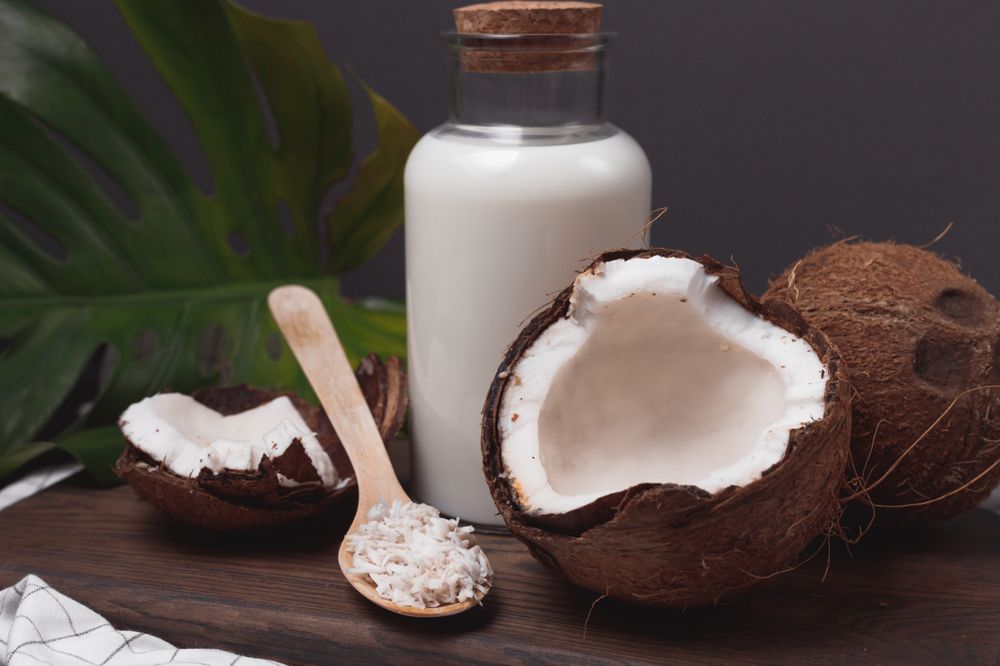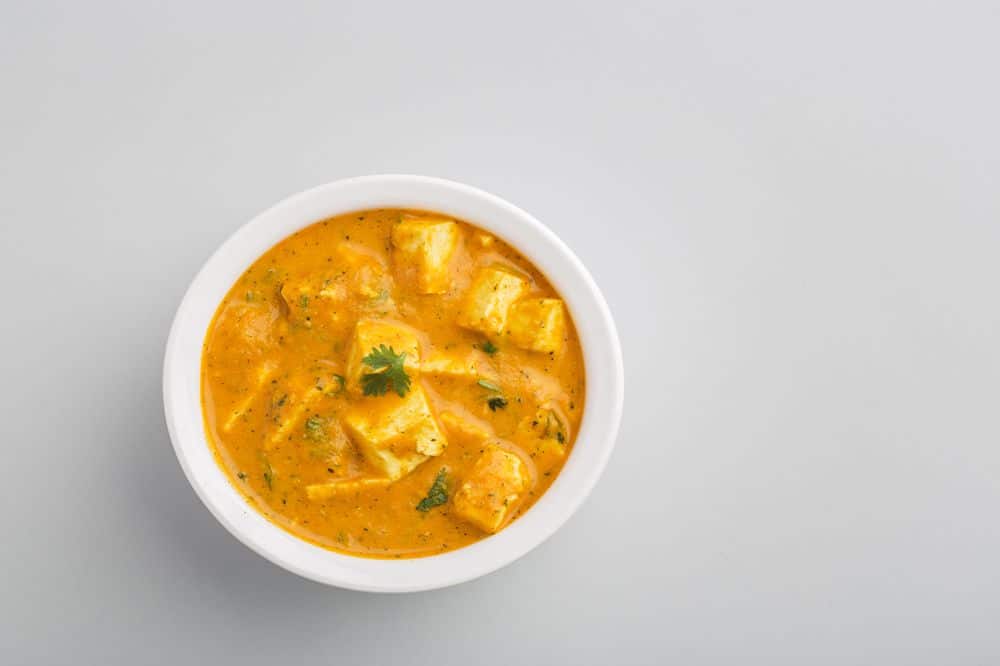In Sanskrit, coconut has another name: Kalpavriksha, the Divine Tree. It is no surprise, as coconut trees essentially provide us with many benefits.
We can utilise nearly every part of the coconut tree. It gives us coconut oil, coconut water and tender coconut. In addition, you can use coconut leaves as utensils and sheds for housing.
Another magical extract from coconut is coconut milk. However, before we start on the benefits of coconut milk, let’s dig in and find out what coconut milk is.
What is Coconut Milk?
Coconut milk is a milky-white substance extracted from grated mature coconut flesh. Coconut is the fruit of the coconut palm scientifically known as Cocos nucifera.
The primary question that comes to our minds is if coconut water and coconut milk benefits are the same? Well, the answer is no. Although both come from coconut and have health benefits, they’re two different fluids.
Unlike coconut water found inside young coconuts, one gets coconut milk by grating the white flesh of the coconut. Then, you soak it in hot water.
As a result, the cream rises and skims off the top. Then, by straining the remaining liquid, one extracts the coconut milk.
How Vinayak Patil Lost 15 kg in 3 Months and Transformed Himself | A HealthifyMe Transformation Story
Chat with us to get started on your health and fitness journey >> https://hlfy.me/YT_Video
Coconut Milk – Nutritional Profile
Based on fat content, there are different subtypes of coconut milk. These subtypes are:
- Cream
- Milk
- Skimmed milk
Coconut cream has the highest fat content, and coconut skimmed milk has the lowest fat content. Coconut milk and coconut cream are also known as “thin coconut milk” and “thick coconut milk”, respectively.
In simple words, thicker coconut milk is always higher in calories and fat. The light coconut milk is thinner in consistency than the thick coconut milk. It is also very subtle when it comes to flavouring.
Nutritional Value of Coconut Milk (Raw) Per 100g
- Energy: 230kcal
- Carbohydrates: 5.5g
- Sugars: 3.3g
- Dietary fibre: 2.2g
- Saturated Fat: 21.1g
- Monounsaturated Fat: 1.0g
- Polyunsaturated Fat: 0.26 g
- Protein: 2.3 g
Minerals in coconut milk include:
- Calcium: 16 mg
- Iron: 1.6 mg
- Magnesium: 37 mg
- Manganese: 0.92 mg
- Phosphorus: 100 mg
- Potassium: 263 mg
- Sodium: 15mg
- Zinc: 0.67mg
It also contains vitamins like:
Vitamin C, Vitamin B1, vitamin B3, vitamin B5, vitamin B6 and Vitamin B1, Vitamin and Vitamin E
Coconut milk has a High Glycemic Index of 97. The glycemic index (GI) measures how quickly our body absorbs glucose from food and raises blood sugar levels.
97 is a very high score and may lead to excessively high sugar levels. Compared to coconut milk, regular cow milk is lower in Glycemic Index, with a GI of only 47.
Moreover, coconut milk has a high glycemic index but a low glycemic load of 4.81. Glycemic load measures the carbohydrate in specific food and the increase in blood sugar levels after consuming one gram of a particular food.
A GL score of 4.81 means that coconut milk raises blood glucose levels slowly. Hence, if you have coconut milk in moderation, it is not harmful.
Health Benefits of Coconut Milk
The benefits of coconut milk are many. Let us take a look at the few significant benefits of it.
1. Helps Increase stamina
Coconut milk is a high-calorie food. A calorie is the energy released when your body digests and absorbs food. More calories mean more energy you get from a particular food. Hence, calories play a significant role in enhancing stamina.
When you work out or perform some strenuous work, there is a high level of fluid loss from your body. In no time, fatigue and cramps kick in.
That is why people carry electrolytes in marathons and cross country running events. The coaches and sports teachers always suggest drinking more electrolytes.
One of the many benefits of coconut milk is that it is rich in electrolytes. The nutritional boost helps you retain the lost fluid. In addition, it allows you to sustain the workout load.
Coconut milk benefits in reducing fatigue and building muscles. In addition, a balanced diet with coconut milk can improve your endurance. It can also act as a tasty post-workout snack.
2. It Helps in Boosting Immunity
People in southeast Asia have always put their faith in Ayurveda and other naturally occurring means of medicine. While the southern parts of India use coconut oil in almost every regional dish, coconut milk is used as an immunity booster worldwide. That is because of its nutritional benefits.
A recent study shows that eating coconut milk porridge can inhibit oxidative damage of protein and DNA in your body. Oxidative damage can have a severe effect on protein structure and integrity.
It can lead to cell damage. In addition, certain amino acids in the body are susceptible to reactive oxygen species (ROS) that can damage proteins.
We are what our genetic makeup is. Thus DNA damage may result in life-threatening issues. Excess DNA oxidation can cause certain diseases and cancers, it may also inhibit this process from the beginning.
The milk has Lauric acid and has anti-inflammatory, antibacterial and antifungal properties. It reduces the risk of infection and boosts the immune response and also helps fight ulcers and infection of the stomach and its linings.
3. Helps in Weight Loss
The technical term for fat is triglyceride. It has two primary purposes, they either burn for energy or get stored as body fat. For example, coconut milk has medium-chain triglycerides. A study confirms that consumption of MCT oil as part of a weight-loss plan improves weight loss compared with olive oil. Therefore, you can successfully include it in a weight-loss diet.
This plant-based milk contains medium-chain triglycerides. Due to their shorter chain length, medium-chain triglycerides are more rapidly broken down and absorbed into the body. Therefore, it makes them a quick energy source and less likely to be stored as fat.
Keto diets are nowadays becoming popular. These diets are low carb diets that may promote weight loss. Since coconut milk is full of nutrients and has saturated fats, it is a fantastic addition to the keto diet plan.
The diet works by depleting the body of its sugar reserves. As a result, it breaks down fat for energy. It results in the production of ketones molecules that our body uses for fuel. When the body burns fats, it can also lead to weight loss.
Among other coconut milk benefits, it is also rich in saturated fats and electrolytes. Therefore, it may be just what you need to lose those few extra kgs. It makes you feel full without adding to the glycemic load. It is less likely to turn into fat and more likely to make you even more active.
4. Helpful for Muscle Health
Coconut milk is an excellent source of triglyceride, which is medium-chain. A study reveals that it helps treat muscle dysfunction and exercise impairment.
In addition, it preserves high temperature-induced impairment in exercise performance and muscle function. It leads to a subsequent increase in mitochondrial biogenesis and metabolism in the skeletal muscle.
5. Promotes Heart Health
A Happy heart means a healthy life. But, unfortunately, with the pace of life speeding up, health often gets behind. Health science is advancing now, and we know almost everything that can cause a cardiovascular accident or a stroke. But can you control all of them?
Some of the factors that can increase the risk of heart diseases are:
- Blood pressure
- High cholesterol /atherosclerosis
- Weight gain
- Smoking
Although coconut milk is high in saturated fats, some studies show that it benefits heart health via other means. For example, coconut milk decreases LDL, which is bad cholesterol. It also increases HDL, which is good cholesterol.
Studies show that plasma triglyceride levels predict cardiovascular disease risk. These diseases are one of the most commonly growing reasons for the early death rate.
It is especially among the young population indulging in junk food. This plant-based milk is perfect for keto diets. These diets help maintain desired weight and act as a healthy choice for maintaining heart health.
Medium-chain triglycerides in coconut milk break down quickly and reduce the risk of being stored as fat. In addition, it decreases the overall build-up in the arteries. As a result, the free and enhanced blood flow promotes proper body oxygenation.
Preparing Coconut Milk at Home
Preparing coconut milk is an easy process. Let us take a look at the steps.
- Take a medium-sized mature coconut, grate the flesh, and then blend it in the mixer using one cup of warm water.
- The strained liquid is the first extract, which is thick.
- You can repeat the same grated coconut process to strain the second and third extracts, respectively. They will be thinner in texture and more subtle in flavour.
- You can use the thick milk for making desserts.
- You can use the thinner milk to prepare soups, curries, etc.
Adding Coconut Milk to Your Meals
There are many ways to add coconut to your diet. If cooking is your passion, then coconut milk is a delight. From sweets to curries, from soups to appetisers, you can add coconut milk to a whole variety of delicacies.
- Coconut milk is a common ingredient in foods popular in Southeast Asia. For example, people often use it for flavouring rice. Coconut rice, coconut chutney, coconut laddoos are a few dishes made in and around India.
- It is also a popular dairy alternative, much like almond milk. You can add it to your coffee and other creamy drinks as an alternative to animal milk. In addition, you can also use it in place of traditional cream or flavoured creamers.
- People prepare many Indian curries using coconut milk to add that royal creaminess. Paneer Kolhapuri with coconut milk is a popular recipe.
- You can also enjoy your oatmeal with coconut milk and sprinkle some almonds. It is a perfectly refreshing breakfast.
- Thai coconut curry chicken is one of the many recipes that include coconut milk as a flavouring agent. Serve this classic South Asian dish over cauliflower rice to keep the calories and carbohydrates low and benefit from the added fibre.
Healthy Coconut Milk Recipes
1. Paneer Kolhapuri with coconut milk
Serves: 2
Preparation Time: 30 mins
Ingredients
- Paneer (cottage cheese): 100 gm
- Unsweetened coconut milk: 1 cup
- Grated Coconut: 1
- Cloves: 4
- Cinnamon: 2 sticks
- Red chillies: As per taste
- Coriander seeds: 2 tsp
- Onions: 2
- Tomato paste: 2 tomatoes
- Ginger garlic paste: 2 tsp
- Coconut milk: 1cup
- Salt: As per taste
- Black Pepper: As per taste
- Oil: 1 tbsp
Instructions
- Roast all the dry ingredients and the grated coconut in a pan for about 5-10mins.
- Let it cool down. Grind all the content and keep it aside.
- Heat 1 tbsp oil in another pan and sauté the onions till soft and translucent
- Add ginger-garlic paste and fry till the raw smell is gone.
- Next, throw in the tomatoes and salt and cook till the tomatoes are cooked, and the oil begins to separate.
- Add the coarsely ground spices and mix well. Simmer for 5minutes.
- Then add the paneer pieces and cover the pan-lid.
- Add 1 cup of unsweetened coconut milk and cook on low flame for about 8-10 minutes.
- Turn off the flame and serve hot with rotis/steamed rice.
2. Thai chicken curry with coconut milk
Serves: 4
Preparation Time: 30 mins
Ingredients
- Boneless skinless chicken breasts: 4
- Red bell peppers: 2-3
- Onions: 2
- Oil: 2 tbsp
- Yellow curry powder (turmeric, cumin, coriander, and fenugreek): 2 tsp
- Red curry paste (dried red chillies, paprika, tomato): 1 tbsp
- Unsweetened coconut milk: 1 cup
- Flour: ½ cup
- Salt: As per taste
- Seasonings: As per your preference
Instructions
- Thinly slice your chicken, then take out a large skillet and add the chicken, peppers, and onions to it.
- Put some oil over and turn the burner up to medium-high heat. Stir and cook for about 5 minutes. Make sure you cook the chicken properly.
- Add the yellow curry powder and stir so that everything gets a coat over.
- Add the coconut milk, red curry paste, crushed red pepper flakes and salt. Stir well and let it boil.
- Dissolve some atta into the water and add that mixture to the pan for desired consistency. Stir for 1-2 minutes while it thickens. Add salt according to your taste. And serve hot with steamed rice.
How to Store Coconut Milk?
Unsurprisingly, like all non-dairy milk products, coconut milk can also go bad if not stored properly. First, let’s talk about shelf life. The shelf life is how long you can consume the food before it gets bad.
The shelf life of coconut milk depends on the type of milk, thick coconut milk or thin coconut milk. It also depends upon the packaging.
What about the coconut milk you bought from the supermarket? Well, most supermarkets sell canned coconut milk, Unopened coconut milk that is canned will have a shelf life of two to five years when properly stored.
Coconut milk in aseptic packaging has a shelf life of between six and twelve months and can last for up to a month of its expiration. Please check the expiration date printed on the back.
Finally, you should consume coconut milk sold in the refrigerated section, which is not in aseptic packaging within a week of the expiration date.
You should use fresh coconut milk as soon as possible because it has no added preservatives. If you are straining it at home, try to use it within two days. It will ensure you consume the nutrition filled, bad-germ-free coconut milk.
Side Effects of Coconut Milk
On the one hand, you can call it the elixir of youth because of its nutritional benefits. But, on the other hand, it can cause you some painful trips to the washroom.
In addition, there are some well researched side effects of coconut milk, from constipation to severe allergic reactions.
1. Weight gain
Coconut milk in large quantities can be harmful. Don’t go overboard! Excess of coconut milk means an excess of saturated fats.
Combining this with a carbohydrate-rich diet will surely add a few pounds to your body. Remember, healthy eating is balanced eating. If you disrupt that balance by overeating or eating irresponsibly, your body will suffer.
2. Constipation
Suppose your body is void of high dietary fibre. In that case, a sudden addition of coconut milk to your diet might cause constipation.
In addition, drinking or having excess coconut milk may lead to severe gas formation and diarrhoea. Fasting and then binging on coconut milk can also cause stomach problems. It will lead to abdominal pain and stomach cramps.
3. High cholesterol
As we know, coconut milk in moderate quantities may raise good cholesterol. However, at times this ratio between LDL and HDL gets imbalanced.
As a result, it increases LDL and HDL. Therefore, people at risk of developing cardiovascular disease have to be cautious when drinking coconut milk for this very reason.
4. Allergic effects
Coconut allergy is a rare phenomenon. However, if you observe any skin rashes, difficulty in breathing, swollen facial features or any other irregularities, visit your doctor at the earliest.
These are the standard features of an allergic reaction. Coconut milk can cause allergies because although coconuts are ‘drupes’, they can have the same effect as tree nuts. In extreme cases, drinking coconut milk could be fatal. It can happen if you have a tree nut allergy.
Frequently Asked Questions (FAQs)
Q. What are the benefits of drinking coconut milk?
A. Coconut milk increases stamina and helps in boosting immunity. In addition, it helps in weight loss and increases the good cholesterol in the body.
Q. Is coconut milk healthier than milk?
A. Although coconut milk has fewer nutrients than dairy milk, it has higher saturated fats. In addition, unlike cow’s milk, coconut milk is lactose-free. Hence, you can use it as a milk substitute for lactose intolerance.
Q. What are the pros and cons of coconut milk?
A. Coconut milk increases stamina and is good for immunity, but it can also cause digestive issues. In addition, having lots of coconut milk can also result in weight gain.
Q. Does coconut milk contain vitamin D?
A. No, it does not contain vitamin D in large amounts. However, you can fortify it with vitamin D and other nutrients for health benefits.
Q. Is coconut milk better than cow milk for weight loss?
A. Yes, coconut milk contains fewer calorie load than cow milk. So, it is better for weight loss.
Q. Is coconut milk keto?
A. Yes. It is suitable for keto diets.
Q. Is coconut milk high in sugar?
A. No, per 100g of coconut milk contains 3.3 g of sugar.
Q. Is coconut milk good or bad for you?
A. In moderate quantities, coconut milk is good for you. However, please see your doctor if you experience any allergic reaction after having coconut milk.
Q. Is coconut milk good for your stomach?
A. Yes, it contains electrolytes and other nutrients responsible for proper digestion. Its anti-inflammatory and antibacterial properties also help fight ulcers in the stomach.
Q. Can I drink coconut milk every day?
A. Yes. But in moderate quantities. Drinking too much can disrupt your health, even cause unwanted, unhealthy weight gain.
Q. Is coconut milk good for your skin?
A. Yes, coconut milk has vitamin C in it. It improves skin texture and elasticity. Thus, it helps in giving you wrinkle-free skin.



